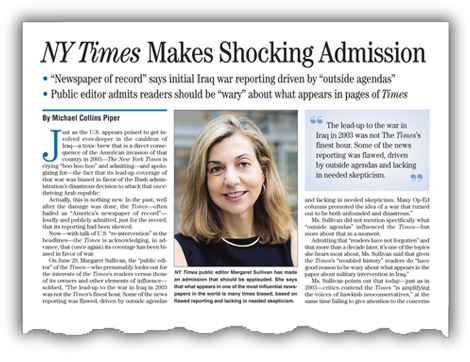
• “Newspaper of record” says initial Iraq war reporting driven by “outside agendas.”
• Public editor admits readers should be “wary” about what appears in pages of Times.
By Michael Collins Piper —
Just as the United States appears poised to get involved ever-deeper in the cauldron of Iraq—a toxic brew that is a direct consequence of the American invasion of that country in 2003—The New York Times is crying “boo hoo hoo” and admitting—and apologizing for—the fact that its lead-up coverage of that war was biased in favor of the Bush administration’s disastrous decision to attack that once-thriving Arab republic.
Actually, this is nothing new. In the past, well after the damage was done, the Times—often hailed as “America’s newspaper of record”—loudly and publicly admitted, just for the record, that its reporting had been skewed.
Now—with talk of U.S. “re-intervention” in the headlines—the Times is acknowledging, in advance, that (once again) its coverage has been biased in favor of war.
On June 28, Margaret Sullivan, the “public editor” of the Times—who presumably looks out for the interests of the Times’s readers versus those of its owners and other elements of influence—sobbed, “The lead-up to the war in Iraq in 2003 was not the Times’s finest hour. Some of the news reporting was flawed, driven by outside agendas and lacking in needed skepticism. Many Op-Ed columns promoted the idea of a war that turned out to be both unfounded and disastrous.”
Ms. Sullivan did not mention specifically what “outside agendas” influenced the Times—but more about that in a moment.
Admitting that “readers have not forgotten” and that more than a decade later, it’s one of the topics she hears most about, Ms. Sullivan said that given the Times’s “troubled history” readers do “have good reason to be wary about what appears in the paper about military intervention in Iraq.”
Ms. Sullivan points out that today—just as in 2003—critics contend the Times “is amplifying the voices of hawkish neoconservatives,” at the same time failing to give attention to the concerns of those who oppose another U.S. intervention. And having reviewed recent news coverage, she admits “the readers have a point worth considering.” She acknowledges the war hawks “are certainly being heard” and that the Times has only included “limited response” from their critics.
Naturally, Ms. Sullivan avoids mentioning what forces may be dictating the Times’s bias: what pro-Israel Jewish writer Michael Kinsley referred to as far back as October 24, 2002 as “the proverbial elephant in the room”—the central role of Israel in the debate over the initial American attack on Iraq. “Everybody sees it, nobody mentions it,” said Kinsley.
It took liberal Representative Jim Moran (D-Va.) to articulate the unmentionable, saying: “If it were not for the strong support of the Jewish community for this war in Iraq, we would not be doing this.” And, naturally, for saying this, Moran took quite a bit of heat.
However, what Moran said—linking Israel and its U.S. supporters to the push for war—was not so extraordinary. On February 18, 2003, then-Israeli Prime Minister Ariel Sharon was calling for America to move on Iran, Libya and Syria after what was presumed to be the successful forthcoming destruction of Iraq. Sharon said, “These are irresponsible states, which must be disarmed of weapons of mass destruction, and a successful American move in Iraq as a model will make that easier to achieve.” At the time, Sharon told a visiting delegation of American congressmen that “the American action [against Iraq] is of vital importance.”
Just days later, on February 27, 2003, the Times reported that Israel not only advocated a U.S. war on Iraq, but that Israel also believed, ultimately, the war should be expanded to other nations perceived as threats to Israel. The Times stated:
Many in Israel are so certain of the rightness of a war on Iraq that officials are already thinking past that conflict to urge a continued, assertive American role in the Middle East. Defense Minister Shaul Mofaz told members of the Conference of Presidents of Major American Jewish Organizations last week that after Iraq, the United States should generate “political, economic, diplomatic pressure’’ on Iran. “We have great interest in shaping the Middle East the day after’’ a war, he said. Israel regards Iran and Syria as greater threats and is hoping that once Saddam Hussein is dispensed with, the dominoes will start to tumble.
On April 16, 2004, the New York-based Forward, one of the most respected Jewish community newspapers in America, summed it all up saying that “on the eve of the war, Israel was a quiet but enthusiastic supporter of America’s war plans” and that “Israel uniquely benefited from a war that is increasingly controversial in America and around the world.”
Now today, we again need to consider the questions surrounding the U.S. attack on Iraq (and Syria and Iran): Who wants war? And who benefits? Looking at what happened in the past, we already have the answers.
Michael Collins Piper is an author, journalist, lecturer and radio show host. He has spoken in Russia, Malaysia, Iran, Abu Dhabi, Japan, Canada and the U.S.


